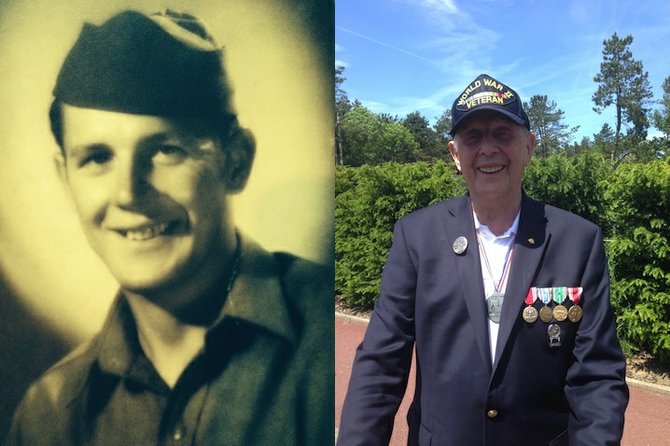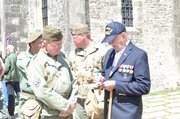While the visual of infantry servicemen during the Normandy Invasion is an iconic World War II visual, lesser known is that of the combat engineers who made the infantry’s progress through enemy territory possible. Veteran Henry Stawicki of Burke recently revisited Europe on the seventieth anniversary of D-Day to commemorate his former role in the 341st Engineer Regiment.
Stawicki said he and his family decided to participate on a ten-day tour of various European cities prominent in WWII history after receiving a letter from the American Battle Commission. Their tour included visits to Normandy, Paris, Luxembourg, Wiesbaden and Frankfurt.
"My family decided it would be interesting to go since it was the seventieth anniversary; there were seven of us who went," Stawicki said. "We went last year, but there weren’t that many veterans there that time. The ceremony was from the city of Normandy; they honored all veterans with a special medal for knighthood."
Stawicki said, as a young man from Pittsburgh, he originally wanted to become part of the infantry after receiving a letter from President Roosevelt, informing him his neighbors had recommended him for service. However, based on test scores he achieved, he was instead assigned to the 341st Engineer Regiment. He landed on Utah Beach a few weeks after D-Day to put his skills into action during the battle’s aftermath.
"The Germans destroyed bridges, and we were there to repair them and put them back up, and also to take care of the minefields," Stawicki said. "When I landed on the beach, I had pneumonia. They wanted to put me in the hospital, but I didn’t want to go because I wanted to travel with the people I had trained with. I survived. I was pretty healthy. In army life, they push you through a lot of hard work. I was blessed, that’s all."
JAN CURLEY, Stawicki’s daughter, accompanied him on his recent visit abroad. She said she spoke to another veteran during the tour who enlightened her regarding the dangers combat engineers such as Stawicki faced at the time.
"He said to me ‘I was in the infantry, but I would’ve rather had a rifle in my hand than a wrench like your father,’" Curley said. "Combat engineers had to build what are called Victory Bridges for the Infantry to cross. They had five to seven days to build a bridge, and while it was under construction, they were surrounded by Germans, and were often under fire, which is why my father and his company earned five bronze stars each."
Stawicki described his experience passing through a concentration camp after Paris had been freed from Nazi control.
"We visited a concentration camp, and the prisoners there were so skinny," Stawicki said. "We weren’t allowed to feed them because they had to go on a special diet, but we could give them cigarettes, so I gave them my two cartons as we were marching through."
Curley said the visit granted her an opportunity to learn more about a major part of her father’s life.
"There was a moment over there where I said to my dad, ‘Wow, I didn’t know about all of this growing up,’ and he said, ‘This is a big part of my life,’" Curley said. "I never thought about it that way, but it was. My dad is part of World War II."
Curley said one major goal both she and Stawicki share is to educate U.S. citizens on World War II and to ensure they do not forget its role in the country’s history.
"In Normandy, those people will always remember," Curley said. "I think that’s the message they want to give the world: please don’t forget. These men and women were heroes, and they formed what we have today. If you ask any of the French, they’ll say, ‘If we didn’t win the war, we could all be speaking German today.’"
Curley said, during her visits to Heatherwood Retirement Community in Burke, where Stawicki currently resides, she has observed a great interest in her father’s stories from other residents.
"When dad arrived back there, so many of them wanted to hear stories about the trip; they’re very interested," Curley said. "A lot of the women, who lost their veteran husbands years ago, never went back to Europe. It’s part of their husbands’ lives, so they enjoy experiencing parts of it again."
STAWICKI SAID ONE KEY DIFFERENCE he observed from landing on Utah Beach in 1944 revisiting Normandy in 2014 was the mood of the local townspeople.
"They were unhappy when I first went over there, and now they’re happy," Stawicki said. "They’re free; they can do what they want to do without anyone telling them what they should or should not do. They really appreciate that we came there. God willing, I’ll be back again next year."

